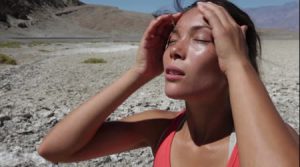 Heat stroke is much more serious than heat exhaustion as it can cost you life. People with heat stroke may suffer from fever, seizures, or may also go into a coma. However, heat stroke is predictable and preventable. There are two types of heat stroke; one is classic or non-exercise-induced the other is exertional or activity-induced. Everyone is susceptible to heat stroke, from athletes to couch potatoes. And, the best defense against any heat-related illness is its prevention. If you take proper precautions and know the warning signs, you can easily prevent the risk of heat stroke. Keep a close watch on the elderly and infants, people on certain medications, athletes, and outdoor workers.
Heat stroke is much more serious than heat exhaustion as it can cost you life. People with heat stroke may suffer from fever, seizures, or may also go into a coma. However, heat stroke is predictable and preventable. There are two types of heat stroke; one is classic or non-exercise-induced the other is exertional or activity-induced. Everyone is susceptible to heat stroke, from athletes to couch potatoes. And, the best defense against any heat-related illness is its prevention. If you take proper precautions and know the warning signs, you can easily prevent the risk of heat stroke. Keep a close watch on the elderly and infants, people on certain medications, athletes, and outdoor workers.
Warning signs:
- Pale skin
- Fatigue, weakness
- Dizzy or nauseous
- Sweating profusely
- Rapid pulse
- Fast, shallow breathing
- Muscle weakness or cramp
In severe cases, you may observe warning signs as below.
Seek treatment immediately if any of these warning signs are present:
- Skin that feels hot and dry, but not sweaty
- Thumping headache
- Frequent troubles of vomiting
- Confusion or loss of consciousness
- Shortness of breath or difficulty while breathing
[box type=”note” ]We treat patients from USA, UK, Canada, Australia, UAE & 180 more countries. Get an expert opinion on your ailment, click here to ask Dr. Shah’s team directly.[/box]
Steps To Prevent Heat stroke During Hot Weather:
- Wear loose-fitting, lightweight clothing.
- Protect against sunburn. Sunburn affects your body’s ability to cool itself, so put on a wide-brimmed hat and sunglasses to protect yourself in the outdoors. Make sure you apply a broad-spectrum sunscreen that has an SPF of at least 15. Put on the sunscreen generously, and you can apply it again after every two hours or more often, particularly if you are swimming or sweating a lot.
- Drink plenty of fluids. Staying hydrated will help your body sweat and maintain a normal body temperature. Also, because you lose salt through sweating, you can replenish salt and water with some sports drinks.
- Don’t drink caffeine, sugary or alcoholic beverages to rehydrate, it can speed up dehydration.These drinks may interfere with your body’s ability to control your temperature. Also, icy cold drinks can cause stomach cramps.
- Open windows and use fans or turn on air conditioning.
- Don’t overexert yourself. Try to schedule exercise or physical labor on cooler times of the day, such as early morning or evening.
- Never leave anyone in a parked car, particularly when parked in the sun, the temperature in your car can rise 20 degrees F (more than 6.7 C) in 10 minutes.
- Take extra precautions with certain medications that can affect your body’s ability to stay hydrated and dissipate heat. For instance, some blood pressure and heart medicines, diet pills (amphetamines), laxatives, some psychological health medicines, seizure medicines, thyroid pills, and oral hypoglycaemic drugs.
- If you suspect heat stroke:
- Move the victim to a cooler location,
- Remove or avoid wearing heavy clothing,
- Fan the body
- Use a cool sponge or clean cloth to wet it down
- Encourage the affected person to drink cool fluids.
- At the hospital, the patient probably will be given fluids
- Heatstroke treatment centers work on cooling your body to a normal temperature to prevent or reduce damage to your brain and vital organs.
– Written by Dr. Sharvari, Associate doctor to Dr. Rajesh Shah
[box type=”note”]Got Questions? Get answers to all the questions regarding your ailment from Dr. Shah directly.[/box]




